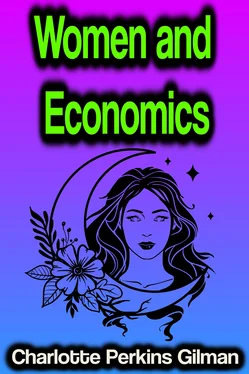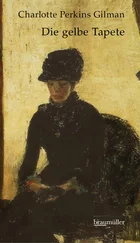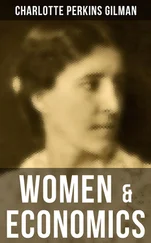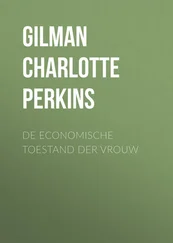To make clear by an instance the difference between normal and abnormal sex-distinction, look at the relative condition of a wild cow and a "milch cow," such as we have made. The wild cow is a female. She has healthy calves, and milk enough for them; and that is all the femininity she needs. Otherwise than that she is bovine rather than feminine. She is a light, strong, swift, sinewy creature, able to run, jump, and fight, if necessary. We, for economic uses, have artificially developed the cow's capacity for producing milk. She has become a walking milk-machine, bred and tended to that express end, her value measured in quarts. The secretion of milk is a maternal function,–a sex-function. The cow is over-sexed. Turn her loose in natural conditions, and, if she survive the change, she would revert in a very few generations to the plain cow, with her energies used in the general activities of her race, and not all running to milk.
Physically, woman belongs to a tall, vigorous, beautiful animal species, capable of great and varied exertion. In every race and time when she has opportunity for racial activity, she developes accordingly, and is no less a woman for being a healthy human creature. In every race and time where she is denied this opportunity,–and few, indeed, have been her years of freedom,–she has developed in the lines of action to which she was confined; and those were always lines of sex-activity. In consequence the body of woman, speaking in the largest generalization, manifests sex-distinction predominantly.
Woman's femininity–and "the eternal feminine" means simply the eternal sexual–is more apparent in proportion to her humanity than the femininity of other animals in proportion to their caninity or felinity or equinity. "A feminine hand" or "a feminine foot" is distinguishable anywhere. We do not hear of "a feminine paw" or "a feminine hoof." A hand is an organ of prehension, a foot an organ of locomotion: they are not secondary sexual characteristics. The comparative smallness and feebleness of woman is a sex-distinction. We have carried it to such an excess that women are commonly known as "the weaker sex." There is no such glaring difference between male and female in other advanced species. In the long migrations of birds, in the ceaseless motion of the grazing herds that used to swing up and down over the continent each year, in the wild, steep journeys of the breeding salmon, nothing is heard of the weaker sex. And among the higher carnivora, where longer maintenance of the young brings their condition nearer ours, the hunter dreads the attack of the female more than that of the male. The disproportionate weakness is an excessive sex-distinction. Its injurious effect may be broadly shown in the Oriental nations, where the female in curtained harems is confined most exclusively to sex-functions and denied most fully the exercise of race-functions. In such peoples the weakness, the tendency to small bones and adipose tissue of the over-sexed female, is transmitted to the male, with a retarding effect on the development of the race. Conversely, in early Germanic tribes the comparatively free and humanly developed women–tall, strong, and brave–transmitted to their sons a greater proportion of human power and much less of morbid sex-tendency.
The degree of feebleness and clumsiness common to women, the comparative inability to stand, walk, run, jump, climb, and perform other race-functions common to both sexes, is an excessive sex-distinction; and the ensuing transmission of this relative feebleness to their children, boys and girls alike, retards human development. Strong, free, active women, the sturdy, field-working peasant, the burden-bearing savage, are no less good mothers for their human strength. But our civilized "feminine delicacy," which appears somewhat less delicate when recognized as an expression of sexuality in excess,–makes us no better mothers, but worse. The relative weakness of women is a sex-distinction. It is apparent in her to a degree that injures motherhood, that injures wifehood, that injures the individual. The sex-usefulness and the human usefulness of women, their general duty to their kind, are greatly injured by this degree of distinction. In every way the over-sexed condition of the human female reacts unfavorably upon herself, her husband, her children, and the race.
In its psychic manifestation this intense sex-distinction is equally apparent. The primal instinct of sex-attraction has developed under social forces into a conscious passion of enormous power, a deep and lifelong devotion, overwhelming in its force. This is excessive in both sexes, but more so in women than in men,–not so commonly in its simple physical form, but in the unreasoning intensity of emotion that refuses all guidance, and drives those possessed by it to risk every other good for this one end. It is not at first sight easy, and it may seem an irreverent and thankless task, to discriminate here between what is good in the "master passion" and what is evil, and especially to claim for one sex more of this feeling than for the other; but such discrimination can be made.
It is good for the individual and for the race to have developed such a degree of passionate and permanent love as shall best promote the happiness of individuals and the reproduction of species. It is not good for the race or for the individual that this feeling should have become so intense as to override all other human faculties, to make a mock of the accumulated wisdom of the ages, the stored power of the will; to drive the individual–against his own plain conviction–into a union sure to result in evil, or to hold the individual helpless in such an evil union, when made.
Such is the condition of humanity, involving most evil results to its offspring and to its own happiness. And, while in men the immediate dominating force of the passion may be more conspicuous, it is in women that it holds more universal sway. For the man has other powers and faculties in full use, whereby to break loose from the force of this; and the woman, specially modified to sex and denied racial activity, pours her whole life into her love, and, if injured here, she is injured irretrievably. With him it is frequently light and transient, and, when most intense, often most transient. With her it is a deep, all-absorbing force, under the action of which she will renounce all that life offers, take any risk, face any hardships, bear any pain. It is maintained in her in the face of a lifetime of neglect and abuse. The common instance of the police court trials–the woman cruelly abused who will not testify against her husband–shows this. This devotion, carried to such a degree as to lead to the mismating of individuals with its personal and social injury, is an excessive sex-distinction.
But it is in our common social relations that the predominance of sex-distinction in women is made most manifest. The fact that, speaking broadly, women have, from the very beginning, been spoken of expressively enough as "the sex," demonstrates clearly that this is the main impression which they have made upon observers and recorders. Here one need attempt no farther proof than to turn the mind of the reader to an unbroken record of facts and feelings perfectly patent to every one, but not hitherto looked at as other than perfectly natural and right. So utterly has the status of woman been accepted as a sexual one that it has remained for the woman's movement of the nineteenth century to devote much contention to the claim that women are persons! That women are persons as well as females,–an unheard of proposition!
In a "Handbook of Proverbs of All Nations," a collection comprising many thousands, these facts are to be observed: first, that the proverbs concerning women are an insignificant minority compared to those concerning men; second, that the proverbs concerning women almost invariably apply to them in general,–to the sex. Those concerning men qualify, limit, describe, specialize. It is "a lazy man," "a violent man," "a man in his cups." Qualities and actions are predicated of man individually, and not as a sex, unless he is flatly contrasted with woman, as in "A man of straw is worth a woman of gold," "Men are deeds, women are words," or "Man, woman, and the devil are the three degrees of comparison." But of woman it is always and only "a woman," meaning simply a female, and recognizing no personal distinction: "As much pity to see a woman weep as to see a goose go barefoot." "He that hath an eel by the tail and a woman by her word hath a slippery handle." "A woman, a spaniel, and a walnut-tree,–the more you beat 'em, the better they be." Occasionally a distinction is made between "a fair woman" and "a black woman"; and Solomon's "virtuous woman," who commanded such a high price, is familiar to us all. But in common thought it is simply "a woman" always. The boast of the profligate that he knows "the sex," so recently expressed by a new poet,–"The things you will learn from the Yellow and Brown, they'll 'elp you an' 'eap with the White"; the complaint of the angry rejected that "all women are just alike!"–the consensus of public opinion of all time goes to show that the characteristics common to the sex have predominated over the characteristics distinctive of the individual,–a marked excess in sex-distinction.
Читать дальше












